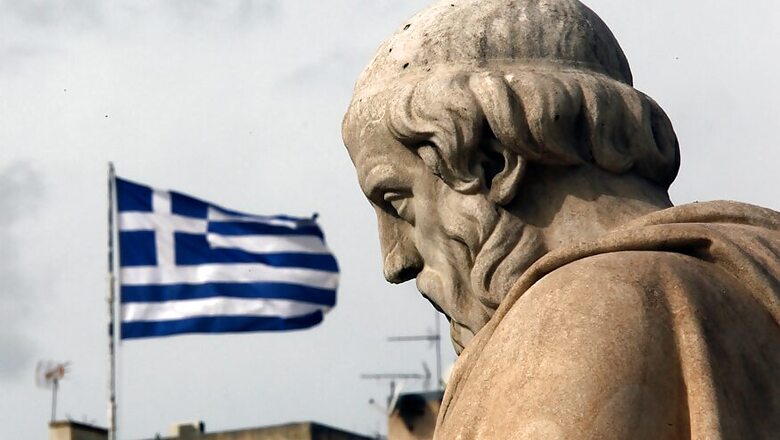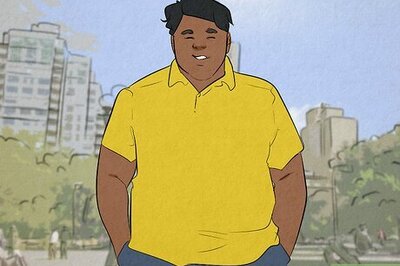
views
Varanasi: The students of Banaras Hindu University have set out to explore the discoveries made by Indian philosophers and scientists in the Before Christ period to find solutions to modern day issues.
While some want to delve into past to prove that caste-based oppression did not exist years ago, others want the world to know about discoveries made in India.
Perturbed by English meteorologists and physicists being attributed for key findings, BHU students are taking up ancient Indian sciences to establish that 600 BC sage scientist Acharya Kanad was the father of atomic theory.
Students like Bihar’s Sukhdev, pursuing third year Geography, have enrolled in a part time course at the university to find a link between ancient Indian studies and modern technologies.
BHU’s Bharat Adhayayan Kendra runs the course in the evening, where students interested in ancient past attend the class right after their regular lectures.
“Whether Kanad was practicing nuclear and atomic science then, we ought to find through ancient texts. The western sciences will not accept his role in nuclear technology. We need to have experts to guide us in a thorough work,” a determined Sukhdev said.
Kanad, the founder of the system of philosophy (Darshan), which is called Vaisheshik and it propounds the doctrine of anu (atoms).The Vaisheshik Darshan is one of the six schools of Indian philosophy - nyaya, samkhya, yoga, mimamsa and vedanta.
He is one of the 50 students enrolled in the new center of Indic Studies called Bharat Adhayayan Kendra, who believe there have been interpolations in ancient texts, and made out to be regressive.
His colleague Arpit Singh, another student in BHU enrolled in the Bharat Adhyayan Kendra would like to check the “veracity of the finding that there was caste oppression.”
What is Bharat Adhayayan Kendra in BHU?
Banaras Hindu University has never compromised on the Indian traditions - There were centers of Veda and Indic studies but it now also has a new Bharat Adhayan Kendra, which is working towards having “multi-disciplinary approach,” in ancient Indian past, something that even the left bastion Jawaharlal Nehru University is planning with its new center on Indic Studies.
The new center in BHU is basically the revival of founder Madan Mohan Malviya’s vision, who started Dharam aur Pareeksha in 1916, for the bona fide students of Banaras Hindu University.
“The course did not decide the merit but was compulsory for the students. And taught everything about our past and religion,” said the coordinator of BAK, Sadashiv Dwivedi who is also professor in the faculty of Arts in Sanskrit.
There were two teachers entrusted with the task of going to different centers and teach about the ancient India and Sanatan Dharam. “But slowly, sometime around the 80s-90s the pareeksha lost the following on campus and left behind a memory of a time, we have brought back that vision of Malviya through Bharat Adhyayan Kendra,” he added.
It was approved by University Grants Commission in 2015 and is currently running from the Faculty of Arts, Abhinav Bhawan. It will continue to function from there till the new building comes up behind Malviya Heritage Complex, where the Geeta Pravachan takes place. Interestingly, the Geeta Pravachan that was started by Madan Mohan Malviya along with the pareeksha in 1916 continues, the pareeksha discontinued.
One might still find some members of BHU faculty having a faint memory of the pareeksha that lost appeal among students, all attempts made to revive failed as well. Professor Kamlesh Datta Tripathi, centennial chair professor at Bharat Adhyayan Kendra was at the forefront of reviving the pareeksha after he returned from his additional charge in another center.
He told News18.com that he was appointed in 1970s when the session took place in Mahila Mahavidyala and it was based on “Sanatan dharam”. He left for an assignment for six years and by the time he returned the pareeksha had become week. “All the efforts to revive it failed,” he said.
Dwivedi is expecting that BAK will be able to go back to 1916 and attract students to the course that is in line with Malviya’s vision - “to teach modern systems of education but do not detach it from the Indian Knowledge Systems. We want to go back to our roots with this.”
He is the son of a Sanskrit scholar and poet, who won the Sahitya Akademi Award for Sanskrit in 1991, Rewa Prasad Dwivedi. His father was the dean of Oriental Learning and Theology, BHU, which is now Sanskrit Vidya Dharam Vigyan Sankaya that gives impetus to Indological studies for incorporating ancient wisdom with modern disciplines.
This center is offering a year-long certificate course in Bharat Adhayayan and a two-year Diploma in applied Sanskrit. They have also proposed to offer an 18 months M.Phil in Bharat Adhyayan.
Different from the Past Centres
“Our civilization goes back thousands of years, in that time span as the well-known Indian scholars have pointed, the 10% texts might have been interpolated and the 90% has remained pure. Our focus will be on that 10% interpolation,” said Dwivedi.
The Kendra would inquire about “Why the Indians lost connect with their past. We are going to adopt logical studies of texts, which will not be driven by emotions, the goal is to change the way the generation thinks,” said Dwivedi.
The focus is on finding out why and where Indians lost the contact with the past thought and tradition. How to continue further innovation and progress based on new leads arising from the study of the ancient Indian Knowledge Systems.
There are other centers that encourage study of the ancient texts. “But so far the study Indian past was confined to a particular discipline and now we will adopt a multi-disciplinary approach,” added Dwivedi.
In his opinion, the values of ancient Indian wisdom cannot be confined to a discipline and cannot be studied in an isolated way – History, Science, Social Science, Women Studies, War and Conflict and Peace – “all this can be approached from the point of view of the ancient Indian wisdom,” he said.
The university has 16 faculties and 5 institutes, 140 departments, two inter-disciplinary centers and five schools.
Moving Away from ‘Euro-centric’ Approach
He spoke about Bharat’s rich tradition of intellectual enquiry that goes back to thousands of years that includes vast Vedic and Agamic literature and non-Vedic traditions such as Buddhism and Jainism. Sanskrit, Pali, Prakrit and the country’s various regional languages are repositories of knowledge in various elements of civilization. This knowledge is enriched through shrutis and smritis, and subsequently transferred to generations in oral as well as written form.
Dwivedi said that the “new research on the glorious Indian intellectual traditions is scant, which is because the academic texts in Indian Education System are mostly Euro-centric.”
The intend to explore: “Why are our students more likely to be aware of Democritus, Archimedes, Plato and Newton than about Panini, Patanjali, Badarayana, Manu, Sankara, Varamhira?”
The study to find the answers is on …



















Comments
0 comment